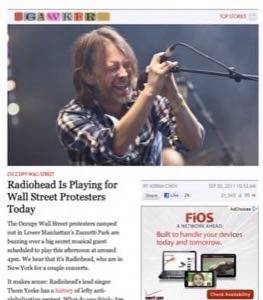For East Coast fans of Radiohead, the news could hardly have been more exciting. The band, multiple news outlets confirmed, would be playing a surprise show in downtown Manhattan on Friday afternoon. The show would coincide with the ongoing Occupy Wall Street protests that had been organized online and with which the band would likely be sympathetic.

Once a few prominent blogs began reporting on it, the news spread like wildfire across Twitter and Facebook, where eager fans posted updates about the show and began making plans to attend.
The only problem, it turned out, was that the story was not true. The band wouldn’t be playing a surprise show in Manhattan, according to a statement from their PR firm. The band’s official Facebook page was then updated with another official denial of the concert’s existence.
By that point, the Internet-fueled rumor had found its way to the front pages of prominent blogs and music news sites like Gawker, Pitchfork, Gothamist and Huffington Post. Long after media outlets followed up and confirmed that the concert wasn’t going to happen, several people on Twitter continued to chatter about it as though it was still on.
So how did this story morph from rumor into front page news so quickly?

Today’s real-time, social media-fueled news cycle is partly to blame. So too, it would appear, is at least one spokesman for the Occupy Wall Street protest, who confirmed to reporters that the concert was on. The official website for the demonstration published a post at 12:13pm EST announcing that “Radiohead will play a surprise show for #occupywallstreet today at four in the afternoon.” Even hours after the rumor had been denied by the band, the post was not updated or redacted.
As word about the concert began to spread on Twitter, people cited that post as an official confirmation of the show’s existence. So too did bloggers, who began publishing the news, further propelling the social Web into a frenzy over the prospect of one of the world’s most popular rock bands playing an impromptu gig for an anti-Wall Street protest. Over the course of several hours, Anonymous repeatedly tweeted that the show would be happening, and even offered up a link to a livestream the concert.
By 4:00pm Eastern Time, the concert had not begun, even as some fans speculated that the band had only denied it to prevent a massive crowd from forming. Hours after protestor organizers fanned the flames of the falsehood, a spokesman for the protest finally came forward and said that they’d been “hoaxed”, confirming that the whole thing was fake.
If nothing else, the affair served as an illustration of how, despite being revolutionary in some ways, our hyper-rapid, Twitter-fueled news cycle can sometimes get facts wrong and help disseminate them regardless. It’s not the first time it’s happened, nor will it likely be the last.
Update: The Village Voice has published an email that was sent to the Occupy Wall Street organizers from somebody claiming to be one of Radiohead’s managers. This phony email appears to be the spark that ignited yesterday’s confusion.
Lead photo by Alterna2.

















